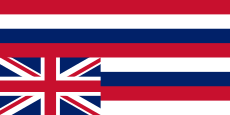| Sovereignty Restoration Day | |
|---|---|
 Kamehameha III, King of the Hawaiian Islands from 1825 to 1854 | |
| Official name | Lā Hoʻihoʻi Ea |
| Also called | Hawaiian Restoration Day |
| Observed by | Hawaii |
| Significance | Restoration of the sovereignty of Hawaiian Kingdom following British occupation during the Paulet Affair (1843) |
| Date | July 31 |
| Next time | July 31, 2025 |
| Frequency | annual |
| First time | 1843 |
| Related to | Hawaiian Independence Day |
| Part of a series on the |
| Hawaiian sovereignty movement |
|---|
 |
| Main issues |
| Governments |
| Historical conflicts |
| Modern events |
| Parties and organizations |
| Documents and ideas |
| Books |
Sovereignty Restoration Day (Hawaiian: Lā Hoʻihoʻi Ea) is a national holiday of the former Hawaiian Kingdom celebrated on July 31 and still commemorated by Native Hawaiians in the state of Hawaii. It honors the restoration of sovereignty to the kingdom, following the occupation of Hawaiʻi by the United Kingdom during the 1843 Paulet Affair, by British Rear-Admiral Richard Darton Thomas and when King Kamehameha III uttered the phrase: Ua Mau ke Ea o ka ʻĀina i ka Pono ('The life of the land is perpetuated in righteousness').
During the monarchy, the holiday was observed annually by the native and foreign communities in Hawaii. King Kamehameha V, who deemed the holiday inappropriate, officially dropped it as a national holiday in 1867 and replaced with Kamehameha Day (on June 11). It was briefly revived as a national holiday from 1891 until the overthrow of the Hawaiian Kingdom in 1893. During the ensuing years of the 1890s, the holiday continued to be observed privately by loyalists of the monarchy as a form of opposition and resistance. It is still celebrated by proponents of the Hawaiian sovereignty movement as a day of resistance against what sovereignty advocates consider an ongoing American occupation of Hawaiʻi. In 2022, the day was recognized by the State of Hawaii as a special day of remembrance.
- ^ Spencer, Thomas P. (1895). Kaua Kuloko 1895. Honolulu: Papapai Mahu Press Publishing Company. OCLC 19662315.